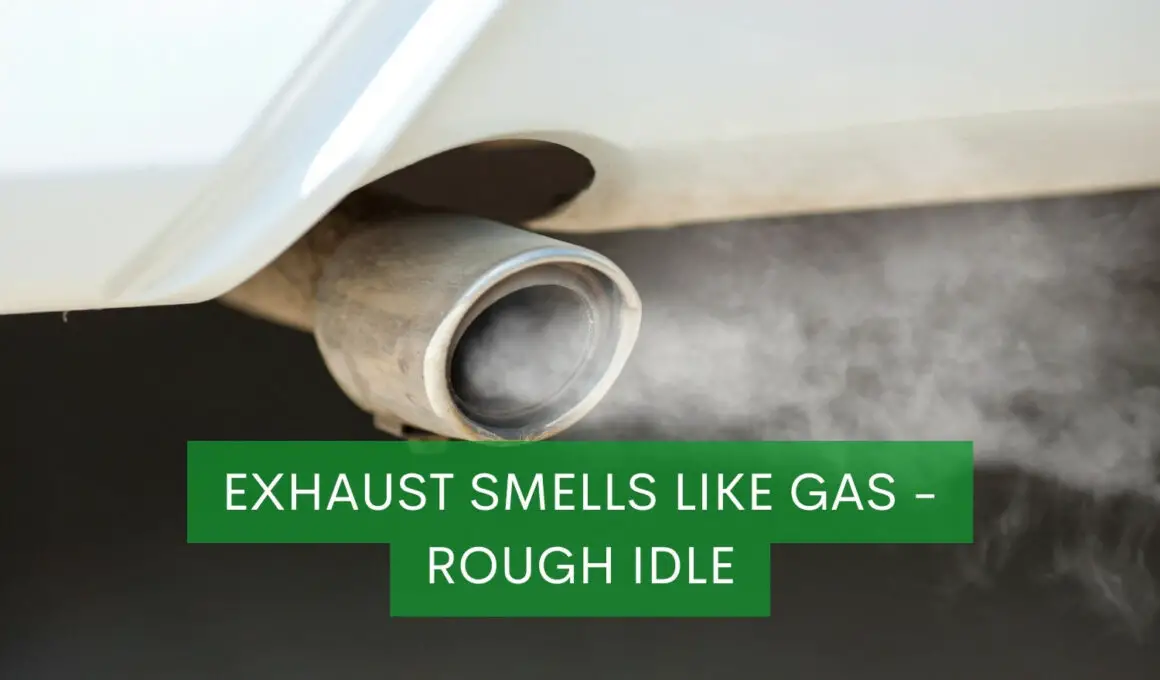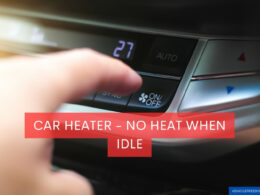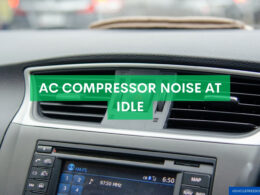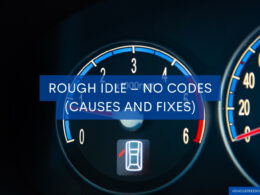In This Article Show
One common issue I’ve seen in many vehicles is an exhaust that smells like gas and a rough idle. If you’ve ever been sitting at a traffic light or stop sign and felt your car shudder, coupled with a distinct gas smell when you step out, you know exactly what I’m talking about.
Understanding what these symptoms mean and how to respond can be the difference between a quick, inexpensive fix and a hefty repair bill. This issue isn’t just an annoyance – it can point to serious underlying problems with your vehicle.
In this blog post, we’ll look into what causes these symptoms and how to fix them. We’ll keep it simple, guiding you through troubleshooting and repairing so you can keep your vehicle running smoothly and efficiently.
It’s important to remember that while we aim to equip you with knowledge, some repairs require professional expertise. After all, I’ve spent over a decade honing my mechanic skills, and some problems need that level of experience. But don’t worry, we’ll highlight these cases so you know when to bring in a professional.

What It Means When Your Exhaust Smells Like Gas and Your Car Idles Roughly
As an experienced mechanic, I can tell you that if your exhaust smells like gas and your car is idling roughly, it’s a clear sign that your vehicle isn’t operating as efficiently as it should be. But what does this mean? Let’s break it down.
Normally, your car’s exhaust should have minimal to no smell. The internal combustion engine in your car is designed to burn fuel (gasoline or diesel) efficiently, converting most of it into power to drive your vehicle. This burning process should produce water vapor and carbon dioxide primarily, which don’t have a strong or noticeable smell.
However, detecting a strong gas smell from your exhaust often means that some unburned fuel is escaping through the exhaust system. This happens when your engine isn’t burning fuel as efficiently as it’s designed to, known as incomplete combustion. This inefficiency not only leads to wasted energy and higher emissions, but it can also result in that gas smell from your exhaust.
Similarly, your car should idle smoothly when standing still with the engine running. If it’s idling roughly, shaking, or vibrating, it indicates that your engine isn’t running evenly. The engine’s rhythm is off, leading to misfires and fluctuations in engine power that cause the rough idle.
Both of these issues – the gas smell from your exhaust and the rough idle – are often interconnected. They typically point towards problems with your vehicle’s fuel, ignition, or exhaust systems. However, keep in mind that while I’ve been a mechanic for 13 years and seen this issue numerous times, every car is unique and may have different underlying issues.
Common Causes of Gas-Smelling Exhaust and Rough Idle
Several factors can cause your exhaust to smell like gas and your car to idle roughly. While it can be a symptom of a singular issue, it often indicates multiple interconnected problems.
Here are some common causes:
1. Improper Fuel-Air Mixture
Your car’s engine needs the right mix of fuel and air for efficient combustion. If this balance is disturbed, it can lead to incomplete combustion, which can cause your exhaust to smell like gas. Simultaneously, an improper fuel-air mixture can lead to engine misfires and a rough idle.
2. Faulty Fuel Injectors
Fuel injectors spray fuel into your engine’s cylinders for combustion. If they’re leaking or not working properly, it can lead to excessive fuel in the engine, causing a gas smell in the exhaust and a rough idle.
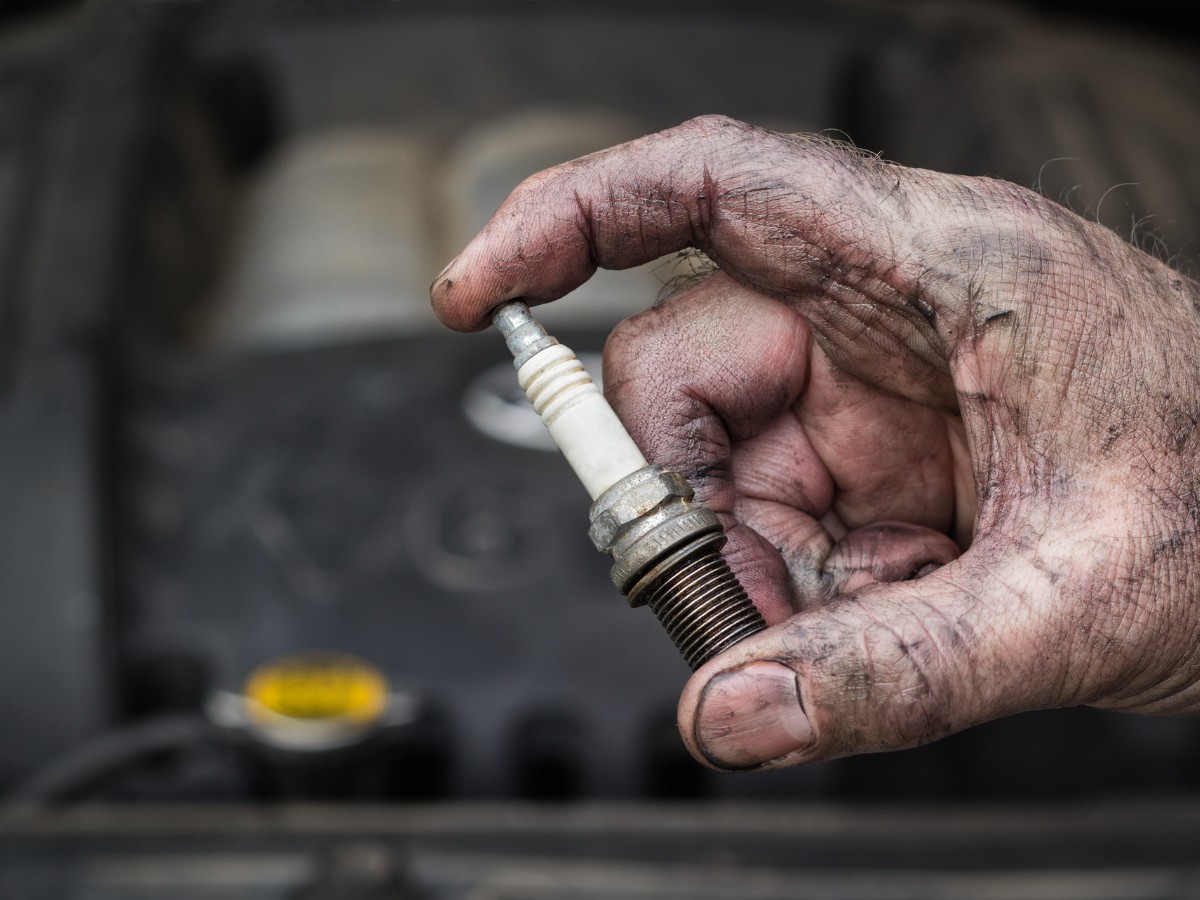
3. Bad Spark Plugs
Spark plugs ignite the fuel-air mixture in your engine’s cylinders. If they’re worn out or malfunctioning, they might not ignite the mixture properly, leading to incomplete combustion and a rough idle.
4. Broken or Damaged Fuel Pressure Regulator
The fuel pressure regulator controls the fuel pressure in your car’s engine. If it’s damaged, it can cause too much fuel to enter the engine, leading to a gas smell in the exhaust and potentially a rough idle.
5. Leaky Exhaust System
If your exhaust system has leaks, it could cause some of the unburned fuel to escape directly, leading to a gas smell. Such leaks can also disturb the backpressure in the exhaust system, which can affect engine performance and cause a rough idle.
Remember, these are only a few of the possible causes. Your car is a complex piece of machinery, and these symptoms could be a sign of other issues.
Recognizing the Symptoms of Gas-Smelling Exhaust and Rough Idle
Now that we’ve discussed some possible causes, let’s talk about the symptoms you might notice when your car’s exhaust smells like gas and the vehicle idles roughly. These symptoms are important because they can help you diagnose the problem and determine what repairs might be necessary.
1. Decreased Fuel Efficiency
One of the first signs you might notice is that you have to fill up your gas tank more often than usual. If unburned fuel is escaping through the exhaust, your car isn’t using fuel as efficiently as it should.
2. The Engine is Running Rough or Misfiring
If your car is idling roughly, shaking, or vibrating, it means that the engine isn’t running smoothly. This could be due to misfires, where the fuel-air mixture in the cylinders isn’t igniting properly.
3. Difficulty in Starting the Vehicle
If you’re having trouble starting your car, it could be because the fuel-air mixture isn’t right, or the spark plugs aren’t igniting the mixture properly. This can also cause the engine to run rough once it starts.
4. Check Engine Light Comes On
Your car’s onboard computer monitors various systems, including the fuel, ignition, and exhaust systems. It will turn on the check engine light if it detects a problem that could affect the car’s emissions or performance.
Remember, these symptoms might not all occur at the same time. You might notice one or two at first, and others might develop over time. The key is to be vigilant and take note of anything unusual.
Step-by-step Guide to Diagnosing the Problem
Diagnosing a car problem isn’t always easy, but with years of experience as a mechanic, I can provide you with a step-by-step guide to help you identify the potential cause of your car’s rough idle and the smell of gas from your exhaust.
Step 1: Check the Fuel-Air Mixture
Your car’s engine management system adjusts the fuel-air mixture. Use an OBD-II scanner to check for error codes that might indicate a problem with the fuel trim, mass airflow sensor, or oxygen sensors. These components play a crucial role in maintaining the correct fuel-air mixture.
Step 2: Inspect the Fuel Injectors
Check for signs of a fuel injector leak, like a strong gas smell under the hood or a misfiring engine. A professional mechanic can also use a fuel pressure tester to accurately check the fuel injectors.
Step 3: Examine the Spark Plugs
Remove the spark plugs and inspect them. If they’re coated in soot or oil, it’s a sign they aren’t working correctly and could be causing the engine to misfire, leading to a rough idle and possibly a gas smell from the exhaust.
Step 4: Check the Fuel Pressure Regulator
A simple way to check the fuel pressure regulator is to pull off the vacuum line. If fuel comes out, it’s a sign the regulator might be faulty. A mechanic should ideally perform this to ensure safety and accuracy.
Step 5: Inspect the Exhaust System
Look under the car at the exhaust system. If you see any visible holes, cracks, or rust, it might indicate a leak. It’s also worth paying attention to unusually loud exhaust noise, which could also be a sign of a leak.
This step-by-step guide will help you diagnose most common problems that cause a gas smell from the exhaust and a rough idle. However, if you can’t find the cause or the problem persists, it’s important to consult with a professional mechanic.
Providing Effective Fixes for Gas-Smelling Exhaust and Rough Idle
Once you’ve diagnosed the problem, the next step is to fix it. Here are the fixes for the common issues we’ve identified:
1. Adjusting the Fuel-Air Mixture
If the fuel-air mixture in your car is off, you’ll likely need to replace faulty components such as the mass airflow sensor or the oxygen sensors. While these are tasks you can undertake yourself with the right tools and guidance, consider seeking professional help if you’re not confident in doing so.
2. Repairing or Replacing Faulty Fuel Injectors
If you’ve found that your fuel injectors are leaking or not working correctly, they’ll need to be repaired or replaced. This relatively complex task involves working with the fuel system, so it’s typically best to let a professional mechanic handle it.
3. Changing Bad Spark Plugs
Replacing worn-out or faulty spark plugs is a maintenance task that most car owners can handle themselves. You’ll need a spark plug socket and a ratchet. When you remove each spark plug, check the gap and adjust it to the manufacturer’s specification before installing the new one.
4. Fixing the Fuel Pressure Regulator
If your fuel pressure regulator is damaged, it will need to be replaced. This is a more complex repair because it involves working with the fuel system. For safety and accuracy, consider hiring a professional mechanic for this job.
5. Repairing the Exhaust System
If your exhaust system has leaks, the leaking component will likely need to be repaired or replaced. Small leaks can sometimes be patched, but larger ones will typically require replacing the whole component. This is a task that can require special tools and equipment, so it’s usually best left to a professional.
Fixing your car’s rough idle and gas smell can improve its performance, fuel efficiency, and emissions, helping you save money and protect the environment. But always remember, when in doubt, seek professional help.
Prevention Tips for Gas-Smelling Exhaust and Rough Idle
Prevention, as they say, is always better than cure. By maintaining your vehicle properly, you can prevent many issues that lead to a gas smell from your exhaust and a rough idle. Here are some tips to help you prevent these problems:
1. Regular Maintenance
Regularly service your car according to the manufacturer’s guidelines. This includes changing the oil, replacing air filters, and keeping the fuel injectors clean. Regular maintenance can help catch potential problems early before they become major issues.
2. Quality Fuel
Use high-quality fuel from trusted providers. Low-quality fuel can lead to deposit buildup in the fuel injectors and other engine parts, affecting its performance.
3. Prompt Repairs
If you notice any problems with your vehicle, such as a drop in fuel efficiency, a rough idle, or a strong gas smell, don’t ignore them. The sooner you diagnose and repair any issues, the less likely they are to cause further damage to your vehicle.
4. Check Spark Plugs Regularly
Spark plugs are crucial to your engine’s combustion process. Regularly check and replace them for wear and tear according to the manufacturer’s guidelines.
5. Monitor the Exhaust System
Monitor your exhaust system for signs of leaks or damage. Regularly check for visible signs of rust, cracks, or holes. If you notice any unusual noises or smells from your exhaust, have it inspected by a professional.
By adhering to these preventative measures, you can keep your vehicle in peak condition, minimizing the risk of facing issues such as a gas smell from your exhaust or a rough idle.
Wrapping it up
In conclusion, these symptoms should not be ignored if your exhaust smells like gas and your car has a rough idle. They may indicate potential issues within your vehicle’s fuel, ignition, or exhaust systems.
While diagnosing and addressing these problems can seem daunting, you can handle them effectively with the right knowledge and a proactive approach.
Regular maintenance and prompt attention to any irregularities in your car’s performance remain key in preventing such issues. If you’re ever in doubt or the problem persists, it’s important to consult a professional mechanic. While DIY fixes can go a long way, the expertise of a professional can ensure your car’s longevity and optimal performance.






